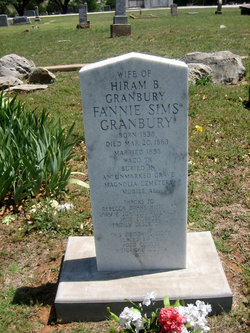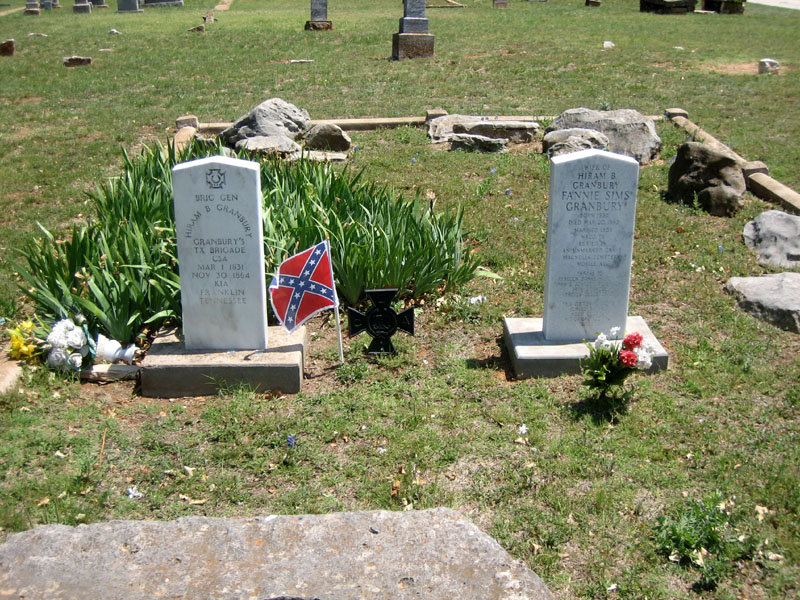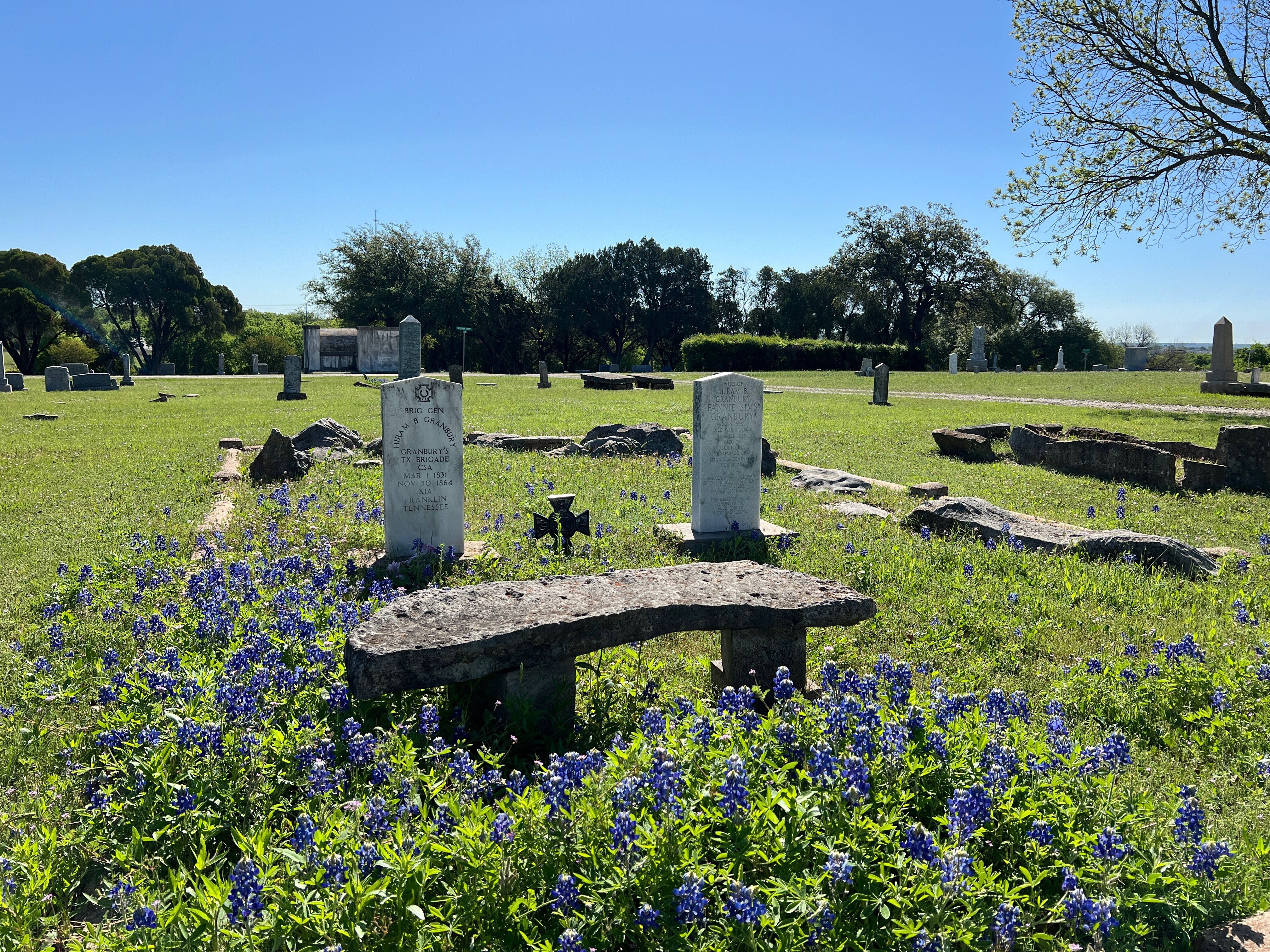"Major Granbury of Texas is rooming with us…How I felt for him when he informed me his lady but twenty four years old had followed him…She will leave Boston tomorrow morning and will arrive in Hagerstown (Maryland)."
Further on March 16:
"Mrs. Granbury, the wife of Major G. of Texas, is now with your ma. She followed her husband to Boston where they had to be separated – left among strangers- I promptly had her to go to my house (Hagerstown)…She is very young and handsome."
The cancer that is ravaging Fannie's health becomes the topic of Doctor Macgill's letters:
May 20th "I am sorry to hear that the Major's lady is not so well. I wish I could see her cured…"
June 27th "I feel very sure she is suffering from ovarian enlargement of a dropsient character…The Major has just received a letter from his lady and I am pleased to say she has very much improved."
July 15th "I wish you to have a talk with Mrs. G. and insist on her submitting to an examination. It is impossible to arrive at the true nature of her disease without this…"
July 30th "Major Granbury left this morning for Baltimore…He appears so grateful for your kindness to his wife and says he never can forget it and hopes he may have the opportunity of reciprocating the kindness."
With his wife's health rapidly deteriorating , Hiram Granbury received a special pardon in order that "he may attend his wife while having a surgical operation performed at Baltimore…" Regrettably, Fannie received no "surgical operation" and would migrate to Alabama with her husband after he received an official pardon in August 1862. A witness saw the two in Chattanooga, Tennessee as they circumvented their way South. They safely made it to Alabama where Fannie was left in the care of her father's home in Tuscaloosa. On March 20, 1863, her battle with cancer came to an end. Confederate Brigadier General John Gregg, a close friend of Hiram, wrote his wife on March 28th:
"Col. Granbury came back today very low spirited. Mrs. Granbury died about ten days since in Mobile, while under treatment for her disease. Col. Granbury went to Montgomery after her and took her down to Mobile for treatment where she died. Poor man, I deeply sympathize with him in his misfortune."
Her husband Hiram Granbury was ultimately promoted to Brigadier General. He was killed at the battle of Franklin, Tennessee on November 30, 1864.
"Major Granbury of Texas is rooming with us…How I felt for him when he informed me his lady but twenty four years old had followed him…She will leave Boston tomorrow morning and will arrive in Hagerstown (Maryland)."
Further on March 16:
"Mrs. Granbury, the wife of Major G. of Texas, is now with your ma. She followed her husband to Boston where they had to be separated – left among strangers- I promptly had her to go to my house (Hagerstown)…She is very young and handsome."
The cancer that is ravaging Fannie's health becomes the topic of Doctor Macgill's letters:
May 20th "I am sorry to hear that the Major's lady is not so well. I wish I could see her cured…"
June 27th "I feel very sure she is suffering from ovarian enlargement of a dropsient character…The Major has just received a letter from his lady and I am pleased to say she has very much improved."
July 15th "I wish you to have a talk with Mrs. G. and insist on her submitting to an examination. It is impossible to arrive at the true nature of her disease without this…"
July 30th "Major Granbury left this morning for Baltimore…He appears so grateful for your kindness to his wife and says he never can forget it and hopes he may have the opportunity of reciprocating the kindness."
With his wife's health rapidly deteriorating , Hiram Granbury received a special pardon in order that "he may attend his wife while having a surgical operation performed at Baltimore…" Regrettably, Fannie received no "surgical operation" and would migrate to Alabama with her husband after he received an official pardon in August 1862. A witness saw the two in Chattanooga, Tennessee as they circumvented their way South. They safely made it to Alabama where Fannie was left in the care of her father's home in Tuscaloosa. On March 20, 1863, her battle with cancer came to an end. Confederate Brigadier General John Gregg, a close friend of Hiram, wrote his wife on March 28th:
"Col. Granbury came back today very low spirited. Mrs. Granbury died about ten days since in Mobile, while under treatment for her disease. Col. Granbury went to Montgomery after her and took her down to Mobile for treatment where she died. Poor man, I deeply sympathize with him in his misfortune."
Her husband Hiram Granbury was ultimately promoted to Brigadier General. He was killed at the battle of Franklin, Tennessee on November 30, 1864.
Inscription
"Wife of Hiram B. Granbury / Married 1858, Waco, TX / Buried in an unmarked grave, Magnolia Cemetery, Mobile, AL. / Thanks to Rebecca Drake, historian; Mary E. Johnson, researcher; Jane Embrose, family descendant / This memorial stone erected by the Hood County Historical Society, 2003"
Family Members
Advertisement
Records on Ancestry
Advertisement






